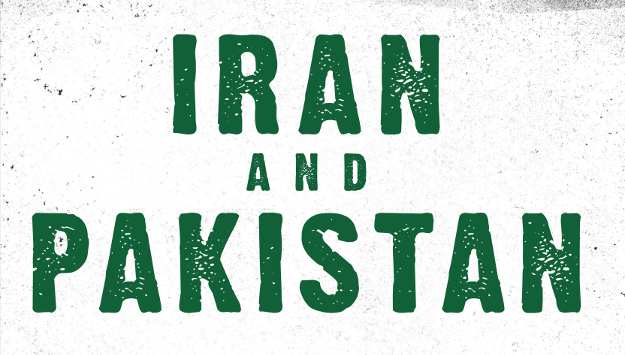For seven decades, Iranian-Pakistani relations have mixed elements of both competition and cooperation. Tensions arose from bilateral disputes, rivalry for regional influence, differing postures toward the United States, or the sectarian divide between majority-Sunni Pakistan and Shi'i Iran. But the two states have also cooperated in fields that are of strategic interest to the United States, including military-to-military assistance, nuclear proliferation, and support for militants that pose a threat to U.S. interests in West Asia. Understanding the depth and complexity of the ties between Tehran and Islamabad is important as the Trump administration and Congress reassess America's Iran policy and its counter-terrorism alliance with Pakistan.
Middle East Institute (MEI) Scholar Alex Vatanka's book, Iran and Pakistan: Security, Diplomacy and American Influence, now available in paperback, elucidates the history, present state, and prospects for this crucial relationship. MEI is pleased to host the author, with discussant Amb. Teresita Schaffer, in a book talk and signing. Marvin Weinbaum, director of Pakistan studies at MEI, will moderate the event.
This event will be livestreamed.
Speaker Biographies
Alex Vatanka
Senior Fellow, MEI
Alex Vatanka is a senior fellow at MEI specializing in regional security affairs, with a particular focus on Iran. From 2006 to 2010, he was the managing editor of Jane’s Islamic Affairs Analyst. From 2001 to 2006, he was a senior political analyst at Jane’s in London, UK, where he mainly covered the Middle East. Vatanka is also a senior fellow in Middle East studies at the U.S. Air Force Special Operations School at Hurlburt Field and teaches as an adjunct professor at the Defense Institute of Security Cooperation Studies at Wright-Patterson Air Force Base. He has lectured widely for both governmental and commercial audiences, including the U.S. Departments of State and Defense, U.S. intelligence agencies, U.S. Congressional staff, and Middle Eastern energy firms. He has written for such outlets as The Christian Science Monitor, Foreign Affairs, Americas Quarterly, CNN.com, Al Monitor, the Journal of International Security Affairs, BBC Persian Online, The National Interest, The World Today, PBS, The Daily Beast, the Jerusalem Post, Journal of Democracy, and the Council of Foreign Relations.
Amb. (ret.) Teresita C. Schaffer, Discussant
Senior Adviser, McLarty Associates
Teresita Schaffer is a consultant with McLarty Associates, trustee of The Asia Foundation, and former senior fellow at the Brookings Institution. She created the South Asia program at the Center for Strategic and International Studies and directed it from 1998-2010. Earlier, during a 30-year career in the U.S. Foreign Service, Ambassador Schaffer was recognized as one of the State Department’s leading experts on South Asia, where she spent a total of 11 years. Her other career focus was on international economic issues. She served in the U.S. embassies in Pakistan, India, and Bangladesh and from 1992 to 1995 as ambassador in Sri Lanka. Among her assignments in the State Department in Washington, she directed the Office of International Trade and was later deputy assistant secretary of state for the Near East and South Asia, at that time the senior South Asia policy position in the State Department.
Marvin Weinbaum, moderator
Director, Center for Pakistan Studies, MEI
Marvin Weinbaum is a scholar-in-residence at the Middle East Institute and professor emeritus of political science at the University of Illinois at Urbana-Champaign. He served as analyst for Pakistan and Afghanistan in the U.S. Department of State’s Bureau of Intelligence and Research from 1999 to 2003. His research, teaching, and consultancies have focused on issues of national security, state building, democratization, and political economy in Afghanistan and Pakistan. He is the author or editor of six books and has written more than 100 journal articles and book chapters. Dr. Weinbaum was awarded Fulbright Research Fellowships for Egypt and Afghanistan and was a senior fellow at the United States Institute of Peace.
Publisher's Description
The respective policies of the governments of Iran and Pakistan pose serious challenges to US interests in the Middle East, Asia and beyond. These two regional powers, with a combined population of around 300 million, have been historically intertwined in various cultural, religious and political ways. Iran was the first country to recognize the emerging independent state of Pakistan in 1947 and the Shah of Iran was the first head of state to visit the new nation. While this relationship shifted following the 1979 Iranian Revolution, and tensions do exist between Sunni Pakistan and Shi‘i Iran, there has nevertheless been a history of cooperation between the two countries in fields that are of great strategic interest to the US: Afghanistan, nuclear proliferation and terrorism. Yet much of this history of cooperation, conflict and ongoing interactions remains unexplored. Alex Vatanka here presents the first comprehensive analysis of this long-standing and complex relationship. (View on Amazon)












